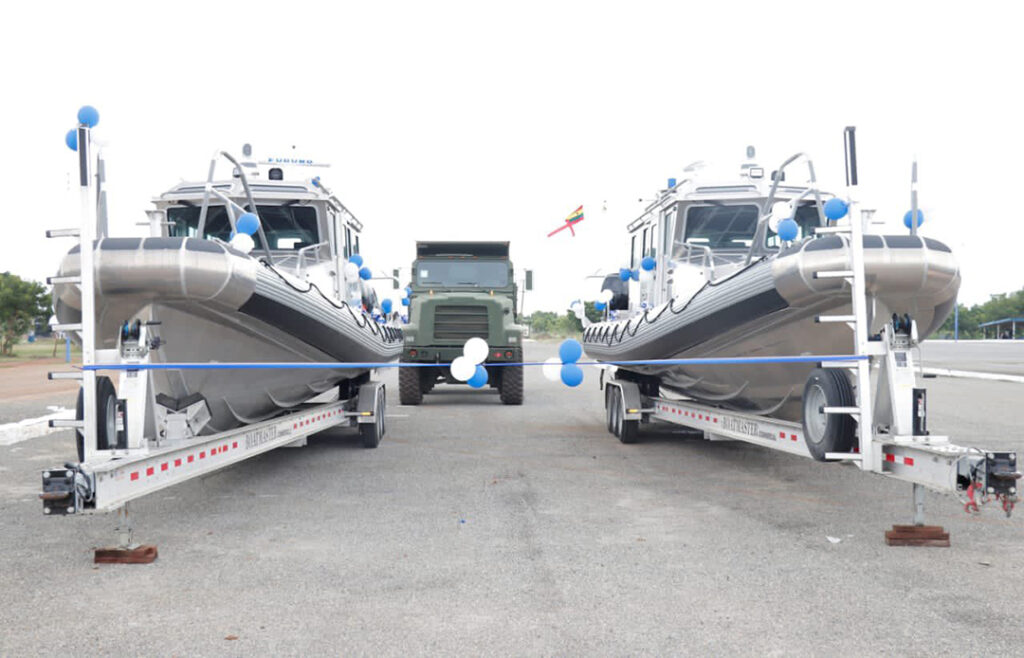ADF STAFF
As it works to secure the Gulf of Guinea from multiple threats, the Ghana Navy received $6.4 million in support from the U.S. government. The funding is part of a $48 million package for the Ghana Armed Forces.
The funds are enough to cover two interceptor vessels, a new pontoon pier at the Ghana Naval Training Command (NAVTRAC), joint training exercises, a new mobile training center for NAVTRAC’s Special Boat Squadron, and the construction of new classrooms at the Nutekpor Basic School located near NAVTRAC.
U.S. Naval Forces Africa will also help complete naval infrastructure construction projects and provide technical support to the Ghana Navy.
Ghana’s Chief of the Defense Staff, Vice Adm. Seth Amoama, said he appreciated the assistance, which coincided with the inauguration of a mobile camp at NAVTRAC that was donated by the Danish government.
“This act of goodwill and generosity reflects their deep commitment to promoting peace and security in our maritime domain and the Gulf of Guinea in general,” Amoama said in a report by Ghanaian newspaper Daily Graphic.
The donations are timely. After years of declining piracy in the Gulf of Guinea, the International Chamber of Commerce’s International Maritime Bureau (IMB) recently warned of an uptick of such attacks in the region.
The Gulf of Guinea experienced five incidents in the first quarter of the year and nine in the second quarter. According to the bureau, 12 were classified as armed robberies and two as piracy. Most of the attacks targeted anchored vessels.
An act is referred to as piracy when it occurs in international waters or outside a country’s jurisdiction; it is called “armed robbery” when it happens inside territorial or internal waters.
This year’s incidents involved the kidnappings of 20 crew members while attackers also destroyed communications and navigation equipment and stole cargo.
The number of piracy incidents in the region fell from 81 in 2020 to 34 in 2021, when the Gulf of Guinea also accounted for all kidnappings at sea worldwide. In 2022, there were only three attacks recorded in the Gulf.
“The resurgence in reported incidents including hostage situations and crew kidnappings in the Gulf of Guinea waters is concerning,” IMB Director Michael Howlett said. “The IMB calls for continued, robust regional and international naval presence as a deterrent to address these crimes.”
West Africa is also the world’s hotspot for illegal, unreported and unregulated (IUU) fishing, which costs the region as much as $9.4 billion annually. China, which commands the world’s largest distant-water fishing fleet, is by far the worst illegal fishing offender in the region and across the globe.
Due to overfishing and other illegal practices, Ghana’s small pelagic fish populations, such as sardinella, have dropped 80% in the past two decades, according to the Environmental Justice Foundation. One species, sardinella aurita, is fully collapsed, meaning the fish population is in steep decline.
More than 100,000 native fishermen and 11,000 canoes operate in the country, but average annual income has dropped by as much as 40% per artisanal canoe in the past 15 years or so, according to the foundation. The decimated fish stocks cause prices to soar and drive food insecurity.
Local fisherman Ofore Kae lamented the situation in an interview with British newspaper The Telegraph. Kae helps repair other fishermen’s boats to help replace lost income from fishing. He wants to someday have his own boat, but he fears there will soon be no fish left to catch.
“I need to make sure that my children can go to school,” Kae said. “Otherwise, they won’t be able to support me when I’m old. It is not easy when fishing is deteriorating. But God has a plan for us.”

